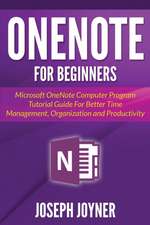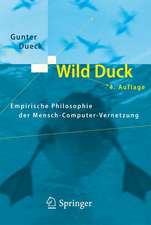Wiki: Web Collaboration
Autor Anja Ebersbach Cuvânt înainte de Gunter Dueck Traducere de Andrea Adelung Autor Markus Glaser, Richard Heigl, Alexander Wartaen Limba Engleză Paperback – 13 iun 2008
Preț: 344.76 lei
Preț vechi: 430.94 lei
-20% Nou
Puncte Express: 517
Preț estimativ în valută:
65.99€ • 71.70$ • 55.47£
65.99€ • 71.70$ • 55.47£
Carte tipărită la comandă
Livrare economică 21 aprilie-05 mai
Preluare comenzi: 021 569.72.76
Specificații
ISBN-13: 9783540351504
ISBN-10: 3540351507
Pagini: 508
Ilustrații: XXIII, 483 p.
Dimensiuni: 155 x 235 x 31 mm
Greutate: 0.76 kg
Ediția:2nd ed. 2008
Editura: Springer Berlin, Heidelberg
Colecția Springer
Locul publicării:Berlin, Heidelberg, Germany
ISBN-10: 3540351507
Pagini: 508
Ilustrații: XXIII, 483 p.
Dimensiuni: 155 x 235 x 31 mm
Greutate: 0.76 kg
Ediția:2nd ed. 2008
Editura: Springer Berlin, Heidelberg
Colecția Springer
Locul publicării:Berlin, Heidelberg, Germany
Public țintă
Professional/practitionerCuprins
Preface.- Preface.- Wiki!?.- The Wiki Concept.- Our First Wiki: MediaWiki.- The Installation.- First Steps.- The Core Functions of MediaWiki.- Formatting.- Multi-Page Structures.- Components: the Function Pages.- Administration.- Extensions.- Life in MediaWiki.- TWiki, the Jack of all Trades.- Installing TWiki.- Working with TWiki.- Formatting in TWiki.- Searching in TWiki.- Structured Data with Forms.- Installing TWiki.- Administering TWiki.- Designing a TWiki..- TWiki as a Project Kit.- Preliminary Thoughts: What is a Project?.- Conceptual Phase: Collecting Ideas and Outlining the Project.- Composing the Project Plan.- Preparing for your Event.- Executing and Documenting an Event.- Go with the Flow: Confluence.- Installing Confluence.- Overview.- Formatting.- Organization.- Settings.- Tools with a Future.- Technical Challenges.- A few Wiki Projects.- The Art of “Sowing” Wikis.- Social Perspectives.
Notă biografică
Anja Ebersbach is an information scientist. She is a university and technical college instructor, and is also active as a freelance IT trainer. She is working on her dissertation on the topic of "Wikis as Tools of Scientific Work."
Markus Glaser, also an information scientist, primarily works as a web and application programmer, where he specializes in MediaWiki and TWiki systems.
Dr. Richard Heigl, a historian, works as a freelance instructor, IT trainer and moderator of large group seminars. He is primarily occupied with the planning and moderation of wiki projects.
Alexander Warta, information scientist, is a doctoral candidate employed at Robert Bosch GmbH in Stuttgart. He is a specialist for the wiki software Confluence.
Markus Glaser, also an information scientist, primarily works as a web and application programmer, where he specializes in MediaWiki and TWiki systems.
Dr. Richard Heigl, a historian, works as a freelance instructor, IT trainer and moderator of large group seminars. He is primarily occupied with the planning and moderation of wiki projects.
Alexander Warta, information scientist, is a doctoral candidate employed at Robert Bosch GmbH in Stuttgart. He is a specialist for the wiki software Confluence.
Textul de pe ultima copertă
About the authors
Anja Ebersbach is an information scientist. She is a university and technical college instructor, and is also active as a freelance IT trainer. She is working on her dissertation on the topic of "Wikis as Tools of Scientific Work."
Markus Glaser, also an information scientist, primarily works as a web and application programmer, where he specializes in MediaWiki and TWiki systems.
Dr. Richard Heigl, a historian, works as a freelance instructor, IT trainer and moderator of large group seminars. He is primarily occupied with the planning and moderation of wiki projects.
Alexander Warta, information scientist, is a doctoral candidate employed at Robert Bosch GmbH in Stuttgart. He is a specialist for the wiki software Confluence.
Wiki – Web Collaboration
Wikis are Web-based applications that allow all users not only to view pages but also to change them. The success of the Internet encyclopedia Wikipedia has drawn increasing attention from private users, small organizations and enterprises to the various possible uses of wikis.
Their simple structure and straightforward operation make them a serious alternative to expensive content management systems and also provide a basis for many applications in the area of collaborative work. We show the practical use of wikis in carrying out projects for users as well as for maintainers. This includes a step-by-step introduction to wiki philosophy, social effects and functions, a survey of their controls and components, and the installation and configuration of the wiki clones MediaWiki, TWiki and Confluence. In order to exemplify the possibilities of the software, we use it as a project tool for planning a conference.
Features and Benefits
Introduces three of the most popular wiki engines
Explores the wealth of possibilities with task oriented examples
Provides an overviewof social and philosophical issues
Includes a CD containing all relevant open source software
Anja Ebersbach is an information scientist. She is a university and technical college instructor, and is also active as a freelance IT trainer. She is working on her dissertation on the topic of "Wikis as Tools of Scientific Work."
Markus Glaser, also an information scientist, primarily works as a web and application programmer, where he specializes in MediaWiki and TWiki systems.
Dr. Richard Heigl, a historian, works as a freelance instructor, IT trainer and moderator of large group seminars. He is primarily occupied with the planning and moderation of wiki projects.
Alexander Warta, information scientist, is a doctoral candidate employed at Robert Bosch GmbH in Stuttgart. He is a specialist for the wiki software Confluence.
Wiki – Web Collaboration
Wikis are Web-based applications that allow all users not only to view pages but also to change them. The success of the Internet encyclopedia Wikipedia has drawn increasing attention from private users, small organizations and enterprises to the various possible uses of wikis.
Their simple structure and straightforward operation make them a serious alternative to expensive content management systems and also provide a basis for many applications in the area of collaborative work. We show the practical use of wikis in carrying out projects for users as well as for maintainers. This includes a step-by-step introduction to wiki philosophy, social effects and functions, a survey of their controls and components, and the installation and configuration of the wiki clones MediaWiki, TWiki and Confluence. In order to exemplify the possibilities of the software, we use it as a project tool for planning a conference.
Features and Benefits
Introduces three of the most popular wiki engines
Explores the wealth of possibilities with task oriented examples
Provides an overviewof social and philosophical issues
Includes a CD containing all relevant open source software
Caracteristici
Offers a guide to the application of Wikis Practice-oriented presentation with directly applicable tools Includes supplementary material: sn.pub/extras









